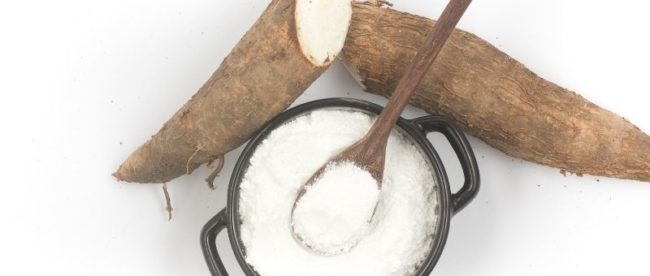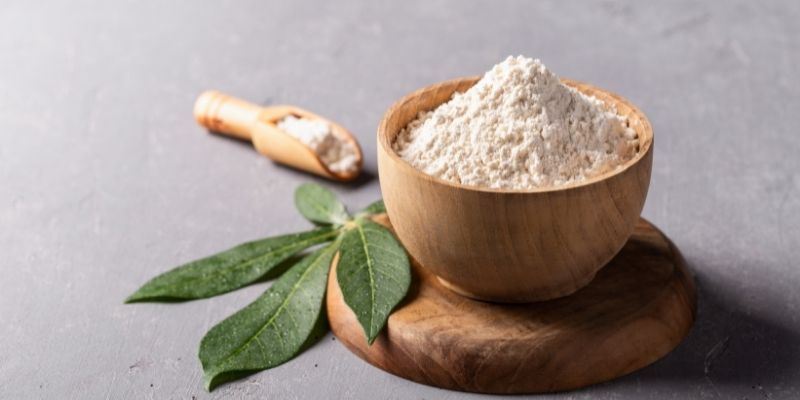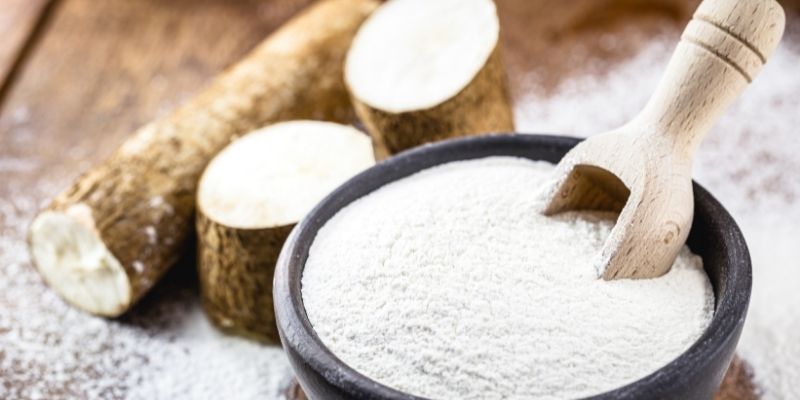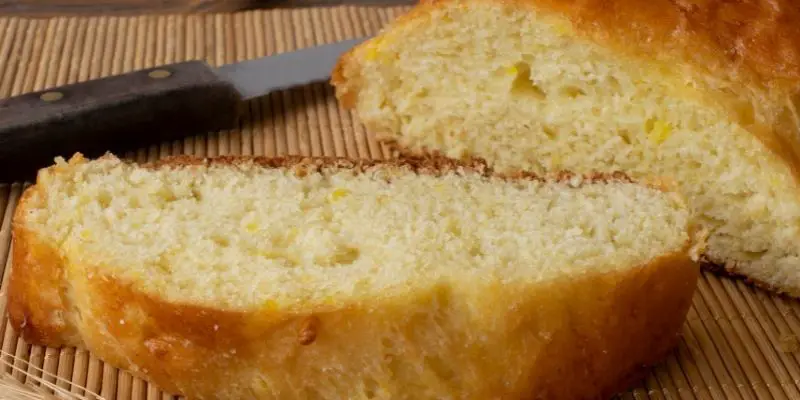Is Cassava Flour Keto? 5 Best Keto Cassava Flour Substitutes (+ Keto Vegan Recipe)

Is cassava flour keto? You would expect a plant with a total cultivated area of more than 13 million hectares to yield significant benefits for a keto diet. And in truth, cassava is a blessing for millions of people, providing vitamins, minerals, and proteins to populations worldwide.
But I was disappointed to learn that cassava flour is not keto-friendly. The carbs in Cassava flour are simply too high. Most resources you consult agree with this assessment. Cassava flour will undo your efforts to enter and stay in ketosis.
Do you have a particular question about cassava flour on keto? Then use the table of contents below to jump to the most relevant section. And you can always go back by clicking on the arrow in the right bottom corner of the page. Also, please note that some of the links in this article may be affiliate links. For more details, check the Disclosure section at the bottom of the page.
What Is Cassava Flour?

Cassava flour comes from a root vegetable called Cassava that humans started eating hundreds, possibly even thousands of years ago. Prevalent in over 80 countries, 800 million people in different corners of the globe include cassava in their diet.
You can peel and eat cassava raw or turn it into flour to make bread, cakes, pancakes, and other items. Like cassava, the flour is highly nutritious, boasting Vitamin C, Niacin, Thiamine, Riboflavin, Potassium, Fiber, and Proteins, to mention but a few.
The root can be toxic, but only if you eat it raw. The naturally occurring cyanide in cassava can cause paralysis, reduce iodine, lead to poor vision, and more.
People reduce the toxicity by soaking, cooking, and fermenting the cassava. Therefore, the flour you buy from a supermarket is perfectly safe for human consumption.

How Many Carbs Are In Cassava?
The raw data doesn’t support the use of cassava in keto diets because one cup of raw cassava has 78g of total carbohydrates, 3.7g of dietary fiber, and 3.5g of sugar.
The average keto diet expects you to cut your intake of carbs. Rather than eliminating carbohydrates completely, I endeavor to keep my daily intake between 20g and 30g, the most common target.
If you exceed the demands of your keto diet, you can maintain ketosis by keeping your carb intake below 50g a day. But a cup of raw cassava surpasses that figure with ease. Cassava flour carbs are just as bad as the root.
An analysis of cassava flour reveals a net carb content of 24.8g and total carbs of 26.8g in a 30g serving.

Is Cassava Flour Keto?
You cannot call cassava flour keto-friendly. Some people give cassava a pass because it benefits the paleo diet. But the paleo diet expects dieters to mimic the eating habits of their ancestors and doesn’t focus on carbs count.
The keto diet wants dieters to lower their carbohydrate intake. A cup of cassava flour will add 78g of carbohydrates to your meal, not to mention 328 calories and 0.6g of fat. It is high in carbohydrates and low in fat, which is not what you want for a keto diet.

Cassava VS Tapioca in Keto

Cassava flour and tapioca flour are not the same. This was news to me a few months ago. People told me that tapioca was made from cassava. Naturally, I assumed that ‘Tapioca’ was a fancy name for ‘Cassava.’ But I was wrong.
People that make tapioca extract a starchy liquid from Cassava pulp before allowing the water to evaporate. Cassava flour is not an extract. To make it, you peel, dry, and grind the root.
This makes cassava flour more fiber-rich than tapioca. Tapioca flour is not toxic like raw cassava. The processes that prepare tapioca will eliminate the harmful elements. However, they do not make tapioca flour keto-friendly. You will find 26.2g of carbohydrates in a serving of 30g. The carbs in cassava flour are roughly the same.

Best Cassava Flour Substitutes For Keto
Is cassava flour keto? No, it isn’t. But you can try the following substitutes:
#1 Almond Flour
A popular alternative with low carbs, a decent protein content, and low-fat levels, almond flour, is the first substitute many people consider. The flour, made from ground almonds, has 5g of carbohydrates, 3g of fiber, 15g of fat, 6g of protein. In other words, it is high in fat and low in net carbs (about 2g per serving), the perfect combination for a keto diet.
Almond meal is a close second. Unlike almond flour, you don’t peel the almonds before grind them, so the almond meal is coarse. Almond meal has 6g of carbs, the same as almond flour.
#2 Coconut Flour
This soft, gluten-free flour comes from dried coconut meat. When you make coconut milk, the elements you leave are dried and turned into a fine powder. Two tablespoons of coconut flour have 3g net carbs (8g total carbs and 5g of fiber).
#3 Psyllium Husk
People use psyllium husk powder to improve cholesterol and lower blood pressure. A tablespoon of psyllium husk has 0g net carbs ( and 4g total carbs and 4g of fiber).
#4 Flax Meal
You make flax meal by grinding flaxseeds. You use flax meal as a substitute for eggs in some recipes. Known for its high fiber content, healthy fats, and antioxidants, two tablespoons of flaxseed meal will contribute 1g net carbs (4g of total carbs and 3g of fiber) to your keto diet.
#5 Xanthan Gum
This polysaccharide additive acts as a thickening agent. It keeps sauces, dressing, and the like together by increasing their thickness. A tablespoon of Xanthan gum has roughly 0g net carbs (1g total carbs and 1g of fiber) per serving.
If that sounds like a lot, you should know that a cup of liquid requires just 1/8 of a tablespoon of Xanthan Gum.

Cassava Bread Recipe (Low-Carb)
Notes
Let the bread cool for an hour before you slice it. It would help if you kept the loaf in an airtight container once it reached room temperature.
Ingredients
- Six tablespoons of flaxseed meal
- 18 tablespoons of water
- two cups of cassava flour
- One tsp of baking powder
- One tsp pink Himalayan salt
- One tbsp of apple cider vinegar
- One tbsp of honey
- ½ Cup of avocado oil
- ½ Cup of water
Instructions
- 1. Mix the "eggs" in one bowel (just mix flaxseed meal with water and set it aside for 15 minutes to set).
- 2. Add the ingredients (Apple Cider Vinegar, Avocado Oil, Honey, and Water).
- 3. Whisk the baking soda, cassava flour, and salt in another bowl.
- 4. Add the wet and dry mixtures together (slowly) and stir.
- 5. Place the batter in a loaf pan and leave in a preheated oven
- 6. Remove the loaf pan after an hour and leave it on a cooling rack
Nutrition Facts
Cassava Bread | Recipe card
Serves: 10
|
Amount Per Serving: 1 slice
|
||
|---|---|---|
| Calories | 146 | |
| % Daily Value* | ||
| Total Fat 3.2g | 4.6% | |
| Saturated Fat 0.5g | 0% | |
| Trans Fat 0g | ||
| Cholesterol 0mg | 0 | |
| Sodium 127mg | 5.3% | |
| Total Carbohydrate 27.5g | 9% | |
| Dietary Fiber 5.2g | 20% | |
| Sugars 1.8g | ||
| Protein 1.4g | ||
| Vitamin A 0mg | Vitamin C 0mg | |
| Calcium 2mg | Iron 1mg | |
* Percent Daily Values are based on a 2,000 calorie diet. Your daily values may be higher or lower depending on your calorie needs.
Vegan Keto Diet Recipes and Tips
Thanks for the graphics: Canva.com

Disclosure: At vegketodiet.com I only mention the products that I researched and considered worthy. But it’s important to note that we are a participant of several affiliate programs, including but not limited to VigLink and Amazon Services LLC Associates Program. As an Amazon Associate, this website earns from qualifying purchases. Also please note that I am not a doctor. As such readers are strongly recommended to make decisions that might affect their health by doing their own research. At vegketodiet.com I only document and describe thoughts, researches and ideas that proved to be working for me.



